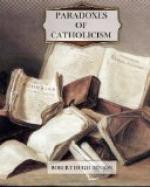He turns in despair, flinging himself from theory to theory—turns to the words of Christ Himself, and the perplexity deepens with every utterance. If Christ be man, how can He say, My Father and I are one? If Christ be God, how can He proclaim that His Father is greater than He? If Christ be Man, how can He say, Before Abraham was, I am? If Christ be God, how can He name Himself the Son of Man.
(ii) Turn to the spiritual teaching of Jesus Christ, and once more problem follows problem, and paradox, paradox.
Here is He Who came to soothe men’s sorrows and to give rest to the weary, He Who offers a sweet yoke and a light burden, telling them that no man can be His disciple who will not take up the heaviest of all burdens and follow Him uphill. Here is one, the Physician of souls and bodies, Who went about doing good, Who set the example of activity in God’s service, pronouncing the silent passivity of Mary as the better part that shall not be taken away from her. Here at one moment He turns with the light of battle in His eyes, bidding His friends who have not swords to sell their cloaks and buy them; and at another bids those swords to be sheathed, since His Kingdom is not of this world. Here is the Peacemaker, at one time pronouncing His benediction on those who make peace, and at another crying that He came to bring not peace but a sword. Here is He Who names as blessed those that mourn bidding His disciples to rejoice and be exceeding glad. Was there ever such a Paradox, such perplexity, and such problems? In His Person and His teaching alike there seems no rest and no solution—What think ye of Christ? Whose Son is He?
II. (i) The Catholic teaching alone, of course, offers a key to these questions; yet it is a key that is itself, like all keys, as complicated as the wards which it alone can unlock. Heretic after heretic has sought for simplification, and heretic after heretic has therefore come to confusion. Christ is God, cried the Docetic; therefore cut out from the Gospels all that speaks of the reality of His Manhood! God cannot bleed and suffer and die; God cannot weary; God cannot feel the sorrows of man. Christ is Man, cries the modern critic; therefore tear out from the Gospels His Virgin Birth and His Resurrection! For none but a Catholic can receive the Gospels as they were written; none but a man who believes that Christ is both God and Man, who is content to believe that and to bow before the Paradox of paradoxes that we call the Incarnation, to accept the blinding mystery that Infinite and Finite Natures were united in one Person, that the Eternal expresses Himself in Time, and that the Uncreated Creator united to Himself Creation—none but a Catholic, in a word, can meet, without exception, the mysterious phenomena of Christ’s Life.
(ii) Turn now again to the mysteries of our own limited life and, as in a far-off phantom parallel, we begin to understand.




